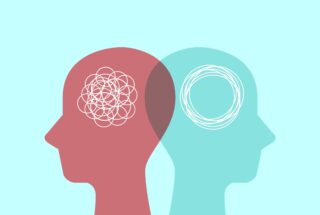At Anchorage Recovery Center, we understand that addiction and mental health problems often go hand in hand. This condition, dual diagnosis, refers to the presence of both a substance use disorder and a mental health disorder.
Dual Diagnosis


Dual Diagnosis
Dual Diagnosis Treatment | Anchorage Recovery Center
Dealing with an alcohol or drug addiction on its own can be difficult. Individuals with dual diagnoses face unique challenges, requiring specialized care to achieve lasting recovery.
Understanding Dual Diagnosis
Dual diagnosis occurs when a person is struggling with both a substance use disorder and a mental health condition.
Some common co-occurring mental health disorders include:
- Anxiety disorders
- Depression
- Attention-deficit hyperactivity disorder (ADHD)
- Bipolar disorder
- Post-traumatic stress disorder (PTSD)
- Borderline personality disorder
- Schizophrenia
According to research, over 24 million people in the United States experience severe psychological distress, with a significant portion also battling substance abuse disorders. Effective dual diagnosis treatment centers address both conditions simultaneously to promote sobriety and prevent relapse.
Why Do Mental Health and Substance Use Disorders Coexist?
The Substance Abuse and Mental Health Services Administration (SAMHSA) states that there are numerous reasons why substance use disorders and mental health disorders frequently coexist.
Your path to recovery is waiting
and we’re here to help.
Our admissions specialist are available 24/7 to listen to your story
and get you started with next steps.
Why call us?
- Shared Risk Factors: Genetic predisposition, stress or trauma, and early exposure to substance use can contribute to both conditions.
- Self-Medication: Many individuals turn to drugs or alcohol to manage symptoms of mental illness. This often worsens their condition over time.
- Substance-Induced Mental Health Issues: Chronic substance use can lead to changes in brain function. This increases the likelihood of developing or worsening mental disorders.
The Dangers of Self-Medication
Some may use substances in an attempt to alleviate emotional pain. Still, self-medication can lead to risks.
- Incorrect diagnosis
- Delays in receiving proper treatment
- Increased risk of dangerous drug interactions
- Worsening of mental health symptoms
- Higher likelihood of developing dependence and addiction
- Masking underlying mental health conditions, making them harder to treat
Dual Diagnosis Treatment at Anchorage Recovery Center
At Anchorage Recovery Center, we offer a comprehensive approach to dual diagnosis treatment. This approach ensures that we treat both addiction and mental health concurrently. We address any additional medical conditions as well.
Our mental health professionals deliver effective treatment for drug and alcohol use disorders and co-occurring conditions. Our programs include the following.
Integrated Treatment Plans
Each patient receives a customized substance abuse and mental health treatment plan that includes:
- Assessment and Diagnosis: Questions identify co-occurring disorders.
- Medical Detox: Safe withdrawal under medical supervision.
- Therapy and Counseling: Evidence-based therapies address both addiction and mental health concerns.
- Medication Management: When appropriate, medications are prescribed to help manage symptoms.
- Support Groups: Peer support, 12-step, and group therapy to encourage long-term recovery.
- Life Skills Training: Assistance in developing essential coping skills for independent living.
Evidence-Based Therapies for Dual Diagnosis
Our specialized therapeutic treatment options include:
- Cognitive Behavioral Therapy (CBT): Helps patients develop healthier thought patterns and coping mechanisms.
- Dialectical Behavior Therapy (DBT): Focuses on emotional regulation and mindfulness.
- Interpersonal Psychotherapy (IPT): Strengthens relationships and communication skills.
- Mindfulness-Based Cognitive Therapy (MBCT): Encourages present-moment awareness and acceptance.
- Motivational Interviewing (MI): Enhances motivation for change and personal growth.
- Trauma-Informed Care: Addresses the impact of past trauma on mental health and substance use.
Medication-Assisted Treatment (MAT)
Certain medications can be beneficial for managing symptoms of dual diagnosis, including:
- Antidepressants: Used to treat depression and anxiety.
- Antipsychotics: Helpful for conditions such as schizophrenia and bipolar disorder.
- Anxiolytics: Prescribed for individuals with severe anxiety.
- Mood Stabilizers: Help manage conditions like bipolar disorder and severe mood swings.
Support for Long-Term Recovery
We offer various support services to help patients transition into substance-free living, including:
- Sober Living Arrangements: Safe and structured environments for continued recovery.
- Family Counseling: Helping loved ones understand and support the recovery process.
- Ongoing Aftercare Planning: Relapse prevention and continued therapy.
- Job and Education Support: Assistance with employment, education, and skill-building for a successful future.
The Importance of Holistic Treatment
At Anchorage Recovery Center, we believe in treating the whole person, not just their symptoms. We incorporate holistic therapies such as yoga, meditation, nutrition counseling, and fitness programs into our treatment plans.
These approaches help reduce stress, improve emotional strength, and encourage healthier lifestyle choices. These all contribute to a successful recovery, starting in addiction treatment.
Helping a Loved One with Dual Diagnosis
If someone you care about is struggling with both addiction and a mental health disorder, it’s hard to know where to start. Encouraging them to seek professional treatment is a good first step.
Family involvement plays a key role in recovery. Anchorage Recovery Center offers resources to educate and support families throughout the treatment process.
If your loved one is hesitant to seek help, consider speaking with a medical professional about intervention options. With the right approach, it is possible to guide them toward the care they need.
Get Help Today
If you or a loved one is struggling with a dual diagnosis, Anchorage Recovery Center is here to help. Our experienced team provides compassionate, evidence-based care to support you on the path to lasting recovery.
Don’t wait to seek help. Call us today at (877) 869-0021 to learn more about our dual diagnosis treatment programs. Take the first step toward a healthier future.